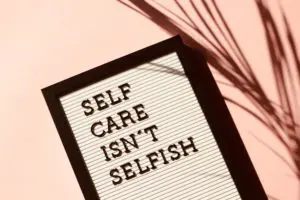What is Self-Care?
Self-care involves practices and activities used to take care of your health (including emotional, physical, spiritual, professional, and relational health; Macedonia, 2018). Self-care often looks different for different people and can include things like creating art, spending time with pets, eating healthy, exercising, getting enough sleep, or meditating. Self-care includes anything that brings you joy and “fills your cup.” Self-care does not include things you are required/obligated to complete or things that deplete you. See here for a self-care assessment: https://socialwork.buffalo.edu/content/dam/socialwork/home/self-care-kit/self-care-assessment.pdf
Why is Self-Care Important?
Inside all of us, we have an internal “battery” of energy we access each day. As we progress through a day, it is not uncommon for our battery to become depleted. To recharge our batteries, for example, we sleep at night to restore our bodies so they are ready for the next day.
When we have experienced trauma or witnessed trauma in the workplace, our batteries can get depleted faster than usual. It takes a lot of energy to process and manage traumatic situations! Self-care activities provide energy to recharge our batteries so that we are able to be the best version of ourselves. This allows us to be better friends, family members, partners, parents, and professionals. As a result, it is really important for those that have experienced trauma (personally or professionally) to practice self-care regularly. If our batteries continually remain depleted for long periods of time, negative consequences can occur (such as anxiety, depression, PTSD, burnout, physical health problems). Like a car or computer that has been on too long; we can also become fried from running on “all cylinders” for too long (Butler, Carello, & Maguin, 2017; Macedonia, 2018; O’Cleirigh, et al., 2019).
Is Self-Care Selfish?
It is not uncommon for many of us to feel guilt or shame when we incorporate self-care into our daily lives. Maybe you have grown up with the belief that a “good person” focuses on others? Or maybe you spend every day giving so much to everyone else that you have forgotten how to take care of yourself? Whatever the reason, if you are struggling with the idea of taking care of yourself, please know you are not alone! Self-care is not selfish; it gives you energy so you can be more effective and present in your everyday life.
Some people find it helpful to create a self-care plan on how to incorporate more self-care in their everyday life. Love playing music but haven’t played in a while? Schedule time each week to play. Haven’t been outside in awhile? Schedule a time to go on a walk. You can also use the self-care assessment provided above to help you come up with additional ideas to add to your schedule. When creating a schedule, one thing you may want to consider is that you are well rounded in all different kinds of self-care. For example, do you generally tend to lean into doing physical self-care (e.g., exercising, getting a massage), but often forget about your emotional self-care (e.g., taking a mental break from responsibility, writing in a journal)? If this sounds like you, you may want to be more heavy on emotional self-care for awhile.
Other people also find it helpful to create an affirmation to remind them why self-care is important. For example:
“If I take care of myself, I can better take care of others”
or
“I am focusing on my health because I DESERVE to be well”
Resilient Retreat is here to help you come up with a self-care plan that works best for you. To speak with a certified trauma professional or learn about other evidence-based programs that Resilient Retreat offers, please call 941-343-0039 or email us at info@resilientretreat.org.
Resilient Retreat writes a blog on trauma every quarter. Please check back in the fall for another blog at resilientretreat.org.

References:
Butler, L. D., Carello, J., & Maguin, E. (2017). Trauma, stress, and self-care in clinical training: Predictors of burnout, decline in health status, secondary traumatic stress symptoms, and compassion satisfaction. Psychological Trauma: Theory, Research, Practice, and Policy, 9, 416–424.
Macedonia, M. F. (2018). Self-care and self-compassion of disaster responders: Predictors of resilience. (Unpublished doctoral dissertation). Antioch University, Culver City, California.
O’Cleirigh, C., Safren, S.A., Taylor, S….Shipherd, J. C. (2019). Cognitive Behavioral Therapy for Trauma and Self-Care (CBT-TSC) in Men Who have Sex with Men with a History of Childhood Sexual Abuse: A Randomized Controlled Trial. AIDS and Behavior, 23, 2421–2431.
